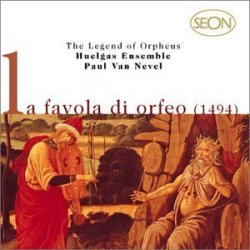La Favola di Orfeo 1494 (The Legend of Orpheus) [1989]
La Favola di Orfeo 1494 (The Legend of Orpheus) [1989]

CD1 1. Introdutto (instrumental) [Tromboncino] 2. Silenzio! Udite! [Anonymous] 3. Ha' tu veduto un mio vitellin bianco [Pesenti] 4. Caro mio Mopso, a piè di questo fonte [Pesenti] 5. Aristeo mio, questa amorosa face [Pesenti] 6. Mopso, tu parli queste cose a' morti [Pesenti] 7. Udite, selve mie dolce parole [Anonymous] 8. Intromessa (Instrumental) [de Lurano] 9. E' non è tanto il mormorio piacevole [Tromboncino] 10. Si ho! [Cara] play 11. Rimanti, Mopso! [Anonymous] 12. O mi convien [Anonymous] 13. O Tirsi, che ti par del tuo car sire? [Tromboncino] 14. Non mi fuggir, Donzella [Tromboncino] 15. Intromessa (Instrumental) [Anonymous] 16. O meos longum [Pesenti] 17. Crudel novella ti rapporto, Orfeo [Anonymous] 18. Intromessa (Instrumental) [Cara] 19. Dunque piangiamo [Anonymous] CD2 1. Pietà, pietà! [Tromboncino] 2. Chi é costui che con si dolce nota [Cara] 3. Costui vien contro le legge de' Fati [Cara] 4. Intromessa (Instrumental) [Tromboncino] 5. O regnator di tutte quelle genti [Tromboncino] [dall'Aquilano] 6. I' non credetti [Tromboncino] 7. Io te la rendo [Tromboncino] 8. Intromessa (Instrumental) [Cara] 9. Ite triumphales [Tromboncino] [Cara] 10. Oimè! Se' mi tu tolta [Tromboncino] [Cara] play 11. Più non venire avanti [Tromboncino] [Cara] 12. Qual sarà mai sí miserabil canto [dall'Aquilano] 13. Quanto è misero l'uom [dall'Aquilano] 14. Fanne di questo Giove intera fede [dall'Aquilano] 15. Intromessa (Instrumental) [Anonymous] 16. Ecco quel che l'amor nostro dispreza! [Tromboncino] 17. (Instrumental) [Anonymous] 18. Ognun segua, Bacco, te! [Pesenti] Josep Benet – Orfeo Nancy Long – Mopso, Furia, Baccante and Pastore Marie Claude Vallin – Tirsi, Prosperina and Euridice Philippe Cantor – Plutone Huelgas Ensemble Paul Van Nevel – conductor
The original two-LP version of La favola di Orfeo, in common with all releases on the earlymusic Seon label, was never systematically distributed in Britain. Although it escaped the GRAMOPHONE net, at least one other journal did publish a perceptive review. Given the severity of that reception, it's surprising to find RCA giving the records a new lease of life on CD. In one sense it is a noble failure: ignore the record title and insert booklet, and the music itself will offer reasonable entertainment. But it does not (and could not) achieve what it sets out to do. Angelo Poliziano's play La favola di Orfeo, first performed in Mantua in 1480, is one of the celebrated forerunners of opera. More than half the text was sung rather than spoken; but the music was formulaic, probably semi-improvised, and it does not survive. It goes without saying that Orfeo therefore cannot be revived except as a spoken play.
Paul van Nevel nevertheless describes his version as a "reconstruction". With no obvious justification, he sets Poliziano's entire play to music, not merely the passages known to have been sung but also the spoken dialogue. His sources are lyrical frottola settings by a slightly later generation of north Italian composers, Marchetto Cara, Bartolomeo Tromboncino and Michele Pesenti. Some of these adaptations sound reasonable enough, some are frankly awkward; but that is not really the point. In style the animated polyphony of the borrowed frottole bears little if any relation to Poliziano's intended medium of semi-recitation, and the alternation between speaking and singing envisaged by the author is ignored completely.
The performances are creditable, sometimes very good, but inevitably they lack dramatic thrust, and individual moments do not connect with one another. Since the instrumentation of frottole is never specified in the sources, van Nevel has made the arrangements himself, sometimes stylishly, although he breaks a golden rule by intermittently mixing loud and soft instruments in a single consort. As to the documentation in the booklet, this is informative on the background to Poliziano's play, but frustratingly silent about the details of musical adaptation. Not even the composers are identified, let alone the titles of the original frottole.
There are no strong grounds, then, for welcoming this re-release. Anyone wishing to know La favola di Orfeo will do better to read the play; those in search of a good recital offrottole by Cara and Tromboncino are far better served by other records in the catalogue. Certainly nobody should believe that in listening to this Orfeo they are witnessing an authentic reconstruction of the earliest known semi-opera. It is, to be blunt, nothing more than a flight of twentieth-century musicological fantasy. ---J.M., gramophone.net
download: uploaded yandex 4shared mediafire solidfiles mega filecloudio nornar ziddu
Zmieniony (Czwartek, 03 Kwiecień 2014 22:33)








